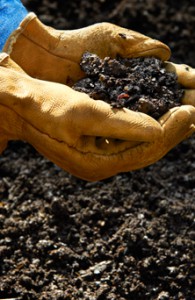green initiatives
composting
The main value of compost is to replenish soil organic matter content, which is critical for plant growth. Without sufficient organic matter in soil, water can’t penetrate a dense mineral soil such as clay and runs right through a coarse soil such as sand. In either case, lacking organic matter, nutrients are carried away by the water either as surface run-off, contaminating the visible bodies of water, or as vertical run-off, contaminating the ground water aquifer. Nutrients from commercial fertilizers are typically released immediately and exhausted in the year of application.
However, nutrients from compost are slowly released and decrease over successive years. Humates from organic matter enhance nutrient uptake by plants and support soil fauna, which help protect plant roots from disease. Compost increases soil moisture retention, infiltration and drainage. By encouraging plant growth, compost also reduces soil runoff and erosion.
The Authority supports composting through its Baltimore City Composting Project and through working with its member jurisdictions to provide up to date research on compost programs and technologies around the country.
Baltimore City Composting Facility
Phone: (410) 354-1636
